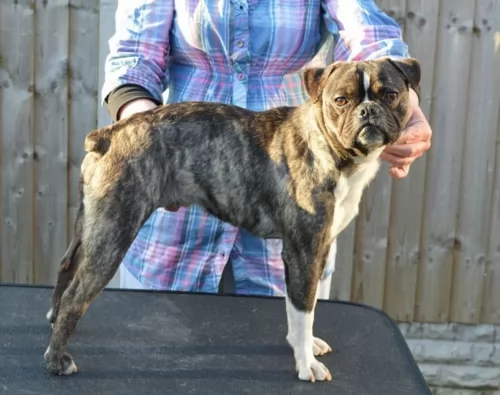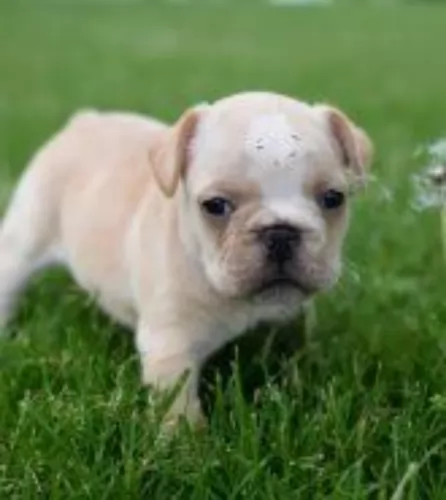 Petzlover
Petzlover Fruggle is originated from United States but St. John's Water Dog is originated from Canada. Fruggle may grow 17 cm / 6 inches shorter than St. John's Water Dog. Fruggle may weigh 28 kg / 61 pounds lesser than St. John's Water Dog. Fruggle may live 3 years more than St. John's Water Dog. Both Fruggle and St. John's Water Dog has almost same litter size. Fruggle requires Moderate Maintenance. But St. John's Water Dog requires Low Maintenance
Fruggle is originated from United States but St. John's Water Dog is originated from Canada. Fruggle may grow 17 cm / 6 inches shorter than St. John's Water Dog. Fruggle may weigh 28 kg / 61 pounds lesser than St. John's Water Dog. Fruggle may live 3 years more than St. John's Water Dog. Both Fruggle and St. John's Water Dog has almost same litter size. Fruggle requires Moderate Maintenance. But St. John's Water Dog requires Low Maintenance
 The Fruggle is a mixed breed/hybrid crossover between a Pug and a French Bulldog. The “Frug” is considered a designer breed, developed in the United States and growing in popularity. These hybrid dogs all can be different taking their looks and characteristics from one or both of the parent dogs in different ways. Within the same litter you can have pups that look like pugs and act like French Bulldogs or look like French Bulldogs and act like pugs.
The Fruggle is a mixed breed/hybrid crossover between a Pug and a French Bulldog. The “Frug” is considered a designer breed, developed in the United States and growing in popularity. These hybrid dogs all can be different taking their looks and characteristics from one or both of the parent dogs in different ways. Within the same litter you can have pups that look like pugs and act like French Bulldogs or look like French Bulldogs and act like pugs.
Also known as a Frenchie Pug, the hybrid is growing in popularity and new to the United Kingdom but recognized by the American Canine Hybrid Club. It is not recognized by the AKC or American Kennel Club. They are developed from purebred dogs but are not a purebred breed at this time. It would take generations of breeding true for that to happen. At the same time the Fruggle is an adorable little dog with characteristics of both its purebred parents.
The French Bulldog is a descendent of dogs that lived with ancient Greeks, the Molossians Phoenician traders spread the dog throughout the known world. These dogs were used in dogs fights and sporting until 1835 when these were outlawed. The Frenchie became a companion dog for the ladies of Paris, writers, artists and fashion designers. The Pug, on the other hand, can trace their history as far back as Confucius in 700BC. They are one of the most ancient dog breeds in existence today. They were the property of the Imperial Family in China, guarded by soldiers. Stealing a pug in Imperial China was punishable by death.
There is no real history or the Fruggle as it is too young in its existence as a separate type of dog. It is considered a breed – just a hybrid breed. In addition to the American Canine Hybrid Club, it is also recognized by the International Designer Canine Registry, the Designer Breed Registry, the Dog Registry of America and the Designer Dogs Kennel Club.
 The breed known as the St. John’s water dog is an extinct landrace breed. They were domestic dogs found in Newfoundland and at times were called the lesser Newfoundland. There is not much information available about the other breeds that went into its development. Hypothetically it is believed they are a mix of the Irish, Old English and Portuguese dogs bred to work.
The breed known as the St. John’s water dog is an extinct landrace breed. They were domestic dogs found in Newfoundland and at times were called the lesser Newfoundland. There is not much information available about the other breeds that went into its development. Hypothetically it is believed they are a mix of the Irish, Old English and Portuguese dogs bred to work.
It is also thought that other breeds in their family tree, descending from them, include the Golden Retriever, the Flat-Coated Retriever, the Chesapeake Bay Retriever, the Labrador and the Curly-Coated Retriever. The Newfoundland is also related to the St. Johns Water Dog through the line of Rafeirio do Alenteios that Portuguese fisherman brought to the island.
The breed was exported to England in the 19th century and early 20th. There the breeds of retrievers were developed. In Canada during this time frame restrictions were placed on dog ownership in order to encourage people to raise sheep. At the same time England imposed a long quarantine on all animals coming into the country in order to get rid of rabies. These two factors contributed greatly to the extinction of the breed. It seems the last two dogs were seen in a remote area in the 1980’s. All attempts to save the breed failed.
 Being a designer dog, the appearance and characteristics of the Fruggle varies from pup to pup. Most do have flat faces, large eyes, and short muzzles. The Frug is a short, sturdy and compact dog. Their tail is over the back in a tight curl, and the ears are round and large. They are called Rose Ears. The nose and eyes are black or very dark and they have wrinkles on the forehead. This is the basic generalization of a mix between the Pug and the French Bulldog. The reality is they are all different. Most often they have a Pugs face with the French Bulldogs ears. They are a little smaller than the French Bulldog and a little larger than the Pug. Their hair is fine, glossy, smooth and short.
Being a designer dog, the appearance and characteristics of the Fruggle varies from pup to pup. Most do have flat faces, large eyes, and short muzzles. The Frug is a short, sturdy and compact dog. Their tail is over the back in a tight curl, and the ears are round and large. They are called Rose Ears. The nose and eyes are black or very dark and they have wrinkles on the forehead. This is the basic generalization of a mix between the Pug and the French Bulldog. The reality is they are all different. Most often they have a Pugs face with the French Bulldogs ears. They are a little smaller than the French Bulldog and a little larger than the Pug. Their hair is fine, glossy, smooth and short.
 St. John’s Water Dog is strong, medium sized and stocky. They looked more like English Labs than American Labs. They had a thick, short coat, loved swimming, had a lot of endurance and rudder tail. It was also described as a thin, black dog with short hair. They had white patches on their chest and feet. His nose was thin and tapered, his legs powerful, his chest muscular. The breed is quick, swims, runs quickly and is a fighter as well.
St. John’s Water Dog is strong, medium sized and stocky. They looked more like English Labs than American Labs. They had a thick, short coat, loved swimming, had a lot of endurance and rudder tail. It was also described as a thin, black dog with short hair. They had white patches on their chest and feet. His nose was thin and tapered, his legs powerful, his chest muscular. The breed is quick, swims, runs quickly and is a fighter as well.
Never accepted by any major kennel club except as a foundation breed. They became extinct.
 The Fruggle is very child friendly
The Fruggle is very child friendly
The Fruggle is a good watchdog and can be taught many tricks.
He is not very adaptable. He can live in city and in apartments much better than in the country or on farms. He needs air conditioning
Is very high as the Fruggle is very intelligent
 The Fruggle can inherit any of the health issues of either parent or they might be healthier than either parent. Some of the issues that the Fruggle might face include:
The Fruggle can inherit any of the health issues of either parent or they might be healthier than either parent. Some of the issues that the Fruggle might face include:
 There is no documented history of any genetic or hereditary illnesses in the breed. However, it seems rational to believe they suffered from ailments similar to Labradors and newfoundland though they are smaller dogs.
There is no documented history of any genetic or hereditary illnesses in the breed. However, it seems rational to believe they suffered from ailments similar to Labradors and newfoundland though they are smaller dogs.
 1/2 cup should be fed daily in two to three meals of high quality dry puppy food
1/2 cup should be fed daily in two to three meals of high quality dry puppy food
1/2 to 2 cups should be fed daily in two meals of high quality dry adult food
Quite often the first generation hybrid has much better health than either of the founding breeds. The same is not true of the second and third generations.
The Fruggle is a laid back dog requiring very little exercise. A daily walk or rolling a ball around the apartment is enough for him. The Fruggle should NOT be exercise vigorously or excessively due to its smashed face and Brachycephalic Syndrome. Weekly visits to a dog park would be sufficient as well. Do not take him out in excessive cold or heat.
 1Feeding the puppy – Don’t overfeed – they have a propensity toward obesity. Feed high quality, high protein 3 x a day.
1Feeding the puppy – Don’t overfeed – they have a propensity toward obesity. Feed high quality, high protein 3 x a day.
2.Feeding the adult – Don’t overfeed. Feed a high quality, high protein 1-2 x a day.
4. Games and Exercises – They need space to run and they love to explore. They would also love to be near water where they could swim. Good at dock diving, field trials, flyball and frisbee.